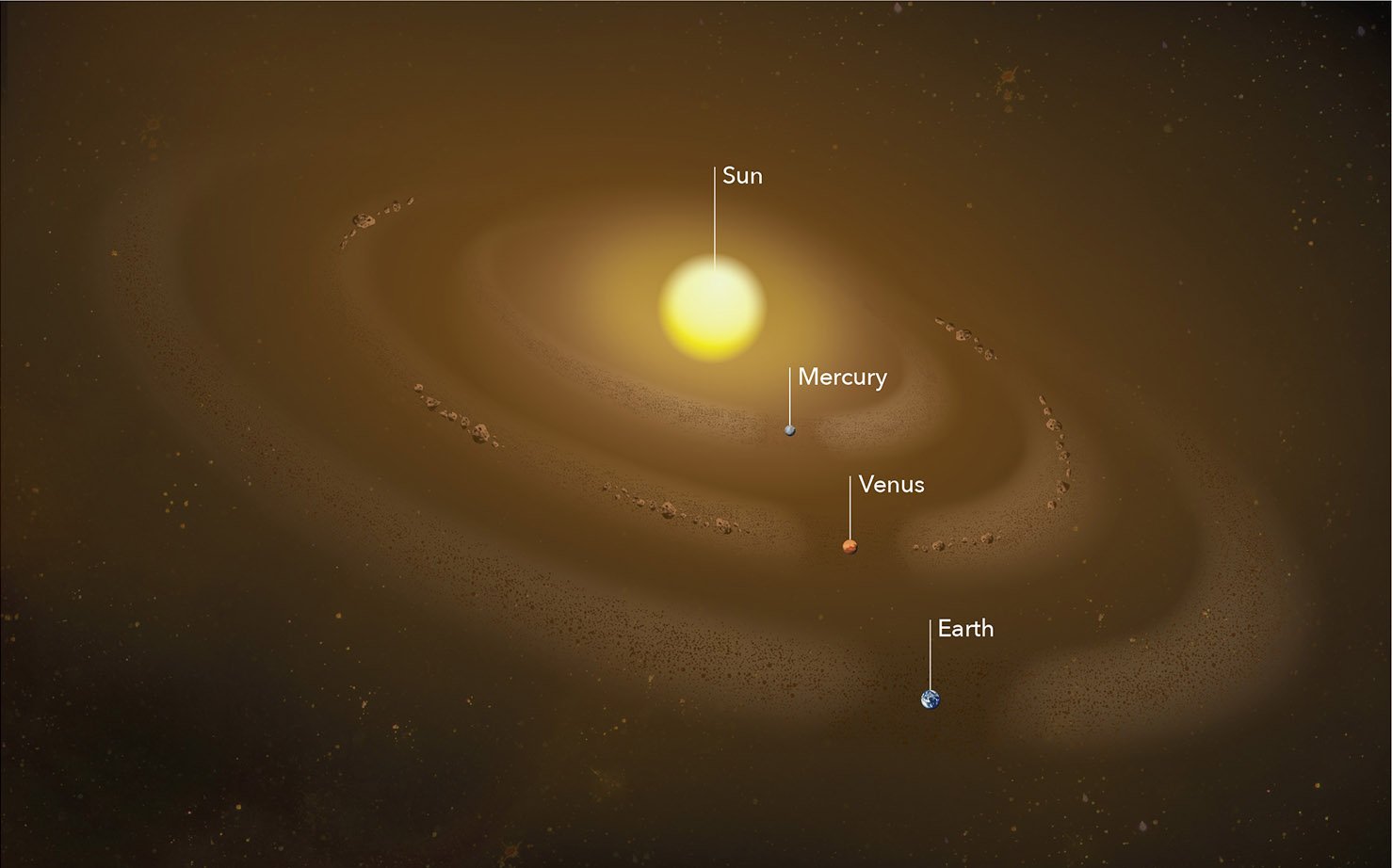According to NASA, our inner solar system is full of dust and debris that can tell us new and interesting things about the formation of planets and our solar system.
In fact, after years of ignoring dust close to the sun, scientists have discovered a ring of dust around Mercury, the planet closest to the sun.
“Dust light” has created problems for studying the sun for years. The light reflected off the dust is actually 100 times brighter than the sun’s outer atmosphere (corona) which is the usual focus for solar scientists. These scientists have worked hard to eliminate the interfering data from the dust.
Then, with the launch and so far successful mission of the Solar Parker Probe, scientists needed to take a closer look at the dust to see how it might interfere with images coming back from the probe. Lo and behold, they discovered the ring around Mercury.
 Credits: NASA’s Goddard Space Flight Center/Mary Pat Hrybyk-Keith
Credits: NASA’s Goddard Space Flight Center/Mary Pat Hrybyk-Keith
Additionally, in another analysis, scientists discovered a new population of asteroids around Venus. Who knew that studying dust could lead to so much information, and how appropriate that these studies have hit the news so close to Ash Wednesday.
Using the “dust” of Lent
By now, with Ash Wednesday several weeks behind us, the reminder, “Remember you are dust and to dust you shall return” has faded into the background. To discipline ourselves, to stay faithful to prayer, and to give alms in time or money to those in need is our present and pressing reality.
But should we forget about those ashes? Maybe we can use the “dust” of Lent to glean some new information, too.
Renewing our minds
In a post on the significance of receiving ashes, we are reminded that an alternate phrase can be used, “Turn away from sin and believe in the Gospel.” This call to repentance, Msgr. Charles Pope states, is echoed by Jesus in Matthew 11:21:
If the miracles that were performed in you had been performed in Tyre and Sidon, they would have repented long ago in sackcloth and ashes.
The Greek word for “repented”, metenoesan, more literally means “to come to a new mind or way of thinking.” Similarly, St. Paul exhorts us to be transformed by the renewal of our minds (Romans 12:2).
Well, how does Lent help us do that?
The disciplines of Lent challenge us to get out of our comfort zone—whether that is giving up a comfort food or ritual, adding a daily spiritual practice like Mass or the Divine Office or the Rosary, and/or giving of ourselves and resources to others. This self-denial or discipline is meant to free us from a preoccupation with ourselves. It works to repair the break in our relationship to ourselves, to God, and others.
And self denial is hard. We are confronted by our weaknesses and shortcomings in a forceful way. This is good news, however, because we experience directly our need for God’s help.
Will life sail along smoothly once we fix the kinks in our own frame?
By His example, Jesus reveals that self-denial and sacrifice are requirements of love. He tells us we must take up our cross daily and come after Him. He also offers encouragement:
“In the world you will have suffering, but be of good cheer for I have overcome the world.”
These words echo His reminder to St. Paul, “My grace is sufficient for you.” His encouragement highlights the need to rely on God’s grace even as we endeavor to prepare fertile ground for its workings.
Change cannot happen in a day. In fact, our conversion is an ongoing endeavor.
While the work of Lent challenges us, this experience can renew our minds: to see God as holding our struggles and failures in His merciful hands. It is to keep hope that our struggles and Lenten practices will indeed bear fruit within us and in the world around us.
Even when dust prevents us from seeing the results.
For help with the daily work of conversion, Fr. Spitzer has summarized an updated version of the daily Spiritual exercises of St. Ignatius here. May you be blessed as you persevere in your struggles through the dust and debris of Lent to the light of the Resurrection!
Read Also:
If You Weren't Able to Complete the 7 Essential Modules in Advent, No Worries—Here Comes Lent
To Go Where Icarus Dared: NASA’S Mission to Touch the Sun
Resisting Temptation Through Ignatian Spirituality

